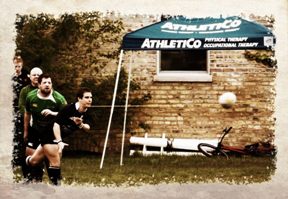Athletico’s Mike Palm Keeps Chicago Lions Rugby on the Pitch
 Athletico has been active in the rugby community for over 20 years, providing athletic training coverage for both matches and training. Chicago Lions Rugby Football Club is one of Athletico’s longest standing relationships – and we are proud to maintain that relationship today as the Official Provider of Physical Therapy to the team.
Athletico has been active in the rugby community for over 20 years, providing athletic training coverage for both matches and training. Chicago Lions Rugby Football Club is one of Athletico’s longest standing relationships – and we are proud to maintain that relationship today as the Official Provider of Physical Therapy to the team.
Athletico’s Mike Palm serves as the team’s head athletic trainer. He is responsible for keeping the team healthy and on the pitch. In addition to his duties with Chicago Lions Rugby Football Club, Mike also heads up Athletico’s Concussion Management program. Mike recently traveled with the Chicago Lions Rugby Sevens team to San Francisco, where they placed second in the USA Rugby Division 1 national championship tournament.
Please describe your role with Chicago Lions Rugby.
I am the head athletic trainer for Chicago Lions Rugby Football Club. Along with the team physician, I am in charge of the health and well being for all of the Chicago Lions teams. Some of my duties include pre-game taping, injury assessment, and acting as a liaison for medical treatment for each of the rugby athletes.
What does a typical day/week look like during the season?
During the week, I provide treatments for all of the injured athletes. These injuries typically include minor ones, such as mild sprains and strains. For those that are more serious, I arrange for them to be seen by a physician and/or be seen for physical therapy. Some typical injuries in rugby include ankle or knee injuries, as well as concussions. On a game day, I typically show up 2 hours before the game to ensure all of the athletes are properly treated and taped for that day’s game. On any given game day there can be 1 or two games. Each game consists of two 40-minute halves.
What do you enjoy most about your role with Chicago Lions Rugby?
One of the aspects that I enjoy about rugby is its uniqueness. There is no other sport quite like it. There is a strong sense of team, which leads to every athlete wanting to do their part. I could pull up to a rugby pitch, and I would almost immediately have 2-3 athletes right there waiting to help me carry all of my equipment to the rugby pitch. Every player pitches in to make their team a complete success.
What is the most challenging aspect of your job?
The most challenging part of my job is only seeing the athletes I work with once or twice a week. This is a challenge because it is difficult to keep track of every possible injury on a team of 35-50 guys, even if I saw them every day. Since I see them only 1-2 times a week, constant communication is imperative to these athletes to ensure they receive the best possible care.
You mentioned that concussions are a reality of rugby. How do you go about treating a player showing signs of a concussion?
Concussions are not as common as some people think in rugby, but they certainly occur. Typical treatment for concussions is to rest the athlete until they are completely symptom free. This means that the athlete cannot participate in practices, games, or physical training. Once the athlete is completely symptom-free, their exertion level is gradually increased over the course of approximately one week.
Occasionally, symptoms do not subside on their own. This is usually due to a deficiency that remains as a result of the concussion. In this occurrence, vestibular physical therapy has been shown to be a great medium to help facilitate full healing.
What advice would you give an aspiring athletic trainer?
I would recommend that an aspiring athletic trainer look for as many different experiences as possible. Through these various experiences they can develop into the most well rounded athletic trainer as possible.

